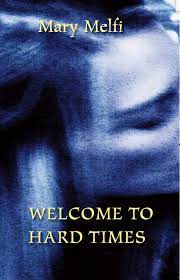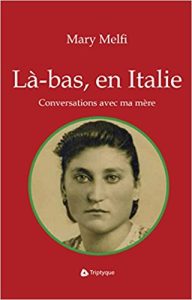 Mary Melfi belongs to the last generation of Italian immigrants to Canada. In the 1950s, she arrived in Montreal and, like most of her fellow immigrants, was schooled in English. This fact was not without implications in a Quebec in the midst of an identity crisis, where Montreal’s linguistic balance became a crucial political issue. Mary Melfi was nevertheless obliged to observe these linguistic and political upheavals as she continued her journey in the English-speaking literary world, which had already been shaped by previous generations of immigrant writers. After the Scots, the Irish and the Ashkenazi Jews, it was now the turn of the Italians to make their mark on the literary scene. And Mary did so with a tenacious ingenuity that was not devoid of brilliance. Editions Guernica was on hand to support her, as its founder, Antonio d’Alfonso, is an inimitable talent scout.
Mary Melfi belongs to the last generation of Italian immigrants to Canada. In the 1950s, she arrived in Montreal and, like most of her fellow immigrants, was schooled in English. This fact was not without implications in a Quebec in the midst of an identity crisis, where Montreal’s linguistic balance became a crucial political issue. Mary Melfi was nevertheless obliged to observe these linguistic and political upheavals as she continued her journey in the English-speaking literary world, which had already been shaped by previous generations of immigrant writers. After the Scots, the Irish and the Ashkenazi Jews, it was now the turn of the Italians to make their mark on the literary scene. And Mary did so with a tenacious ingenuity that was not devoid of brilliance. Editions Guernica was on hand to support her, as its founder, Antonio d’Alfonso, is an inimitable talent scout.
Mary Melfi soon stood out. The surrealism of her poetic universe, punctuated by abrupt phrasing and populated by surprising, lapidary images, reflects the inequalities of a society overwhelmed by progress. Over the years, she has published a dozen books, including two novels and a play. Her latest opus, Welcome to Hard Times, is no exception. The title itself is not insignificant. It refers expressly to two novels of the same name. The first, by E.L. Doctorow, was made into a film in 1967 (with Henry Fonda in the lead role); the second, by Dickens, tells the story of a devastating strike in the Manchester mills in the 19th century. It’s no coincidence that this fight against evil and exploitation is also the leitmotif of Melfi’s work. Divided into eight sections, the poems in this recent collection describe a world made even crueler and more absurd by the impoverishment brought about by hypercapitalism. ‘ Being poor is synonymous with living in the desert/with machine guns for company/Nothing Much to eat/Nothing much to do.
This is Melfi’s style. Reduced to the bone. Anger, revolt and irony run between the lines. Faced with the fears induced by the alleged excesses of multiculturalism, she asserts: “Some say such divisions are destructive. Some say my country is being destroyed-/divide a proton and see what happens!/I say: Don’t worry. But this elliptical poetry is also keen to settle accounts with God himself and his crucified son! In her poem The Man from Beyond Time, Superman is the Jesus Christ of the 21st century… Superman performs miracles, so does Jesus Christ/except Superman decides whom he helps out/but anyone can pray to Jesus Christ/and get Him to come round and work his magic/so Jesus Christ is the real superhero in this saga/if you ask me/. The superimposition of these scrappy phrases exudes a false naiveté that gives her writing all its aplomb and originality.
 This is particularly true of her story “Là-bas en Italie, conversation avec ma mère”, the original of which was published in 2009 by Guernica. Antonio D’Alfonso, her historic publisher, presents it with sensitivity and modesty. Reading the hundred or so columns in this editorial UFO, halfway between ethnographic document, autobiography and dramatic comedy, I can’t remain indifferent. These chronicles, born of the intertwining of two strong individualities, are also mine. More than once, I found myself, like the child I was then. They punctuate my own journey. The song “La casetta piccolina in Canada” was still on the charts when I left the port of Naples. Here’s what she had to say about that port: “Naples, city of jubilation and sorrow. A city of beginnings and endings. Can history be remade? It all depends… Do the poor weigh in the balance? Is America the biblical land of milk and honey? Is there life after death? That says it all. By tracing the thread of his own life, Melfi reveals the other, invisible, hidden side of History: the one we want to forget because it reminds us of the time when we were poor. Suddenly, this story is no longer a personal, intimate tale, a “wives’ tale”, but rather the eternal story of exile, of generations, and through it, the story of our human condition. It is in this way that this book becomes universal. At a time when right-wing extremists around the world are thriving on denouncing immigration, everyone should read it.
This is particularly true of her story “Là-bas en Italie, conversation avec ma mère”, the original of which was published in 2009 by Guernica. Antonio D’Alfonso, her historic publisher, presents it with sensitivity and modesty. Reading the hundred or so columns in this editorial UFO, halfway between ethnographic document, autobiography and dramatic comedy, I can’t remain indifferent. These chronicles, born of the intertwining of two strong individualities, are also mine. More than once, I found myself, like the child I was then. They punctuate my own journey. The song “La casetta piccolina in Canada” was still on the charts when I left the port of Naples. Here’s what she had to say about that port: “Naples, city of jubilation and sorrow. A city of beginnings and endings. Can history be remade? It all depends… Do the poor weigh in the balance? Is America the biblical land of milk and honey? Is there life after death? That says it all. By tracing the thread of his own life, Melfi reveals the other, invisible, hidden side of History: the one we want to forget because it reminds us of the time when we were poor. Suddenly, this story is no longer a personal, intimate tale, a “wives’ tale”, but rather the eternal story of exile, of generations, and through it, the story of our human condition. It is in this way that this book becomes universal. At a time when right-wing extremists around the world are thriving on denouncing immigration, everyone should read it.
Melfi succeeds in the trick of making a banal life seem moving, funny and fascinating, without ever falling into melodrama. Apparently, girls are better at this than boys. This is shown by the large number of artistic initiatives on the same theme in France and, no doubt, elsewhere in Europe. Mary Melfi was a pioneer in this field. And what a pioneer she was! Mordant, ironic and capable of self-mockery, she integrates her mother’s many recipes into her memories! Because the passing of the torch also takes place in the womb, in both senses of the word. Is it any wonder that this book ends with recipes for cookies?
*
In short, let’s make our amends here. Wary of the miserabilism associated with immigration and its melodramatic overtones, I was mistaken in initially classifying this book in that category. I’ve always felt that stories like this could only be told if they were the result of either exile – i.e., the impossibility of return – or tragedy. That’s why I decided from the outset to dramatize it in novels, which, alas, are nowadays plagued by bloody news stories. For me, the ” educational novel ” was the obvious way to tell this hidden story. The Polytechnique tragedy, which took place over thirty years ago in Montreal, was an eye-opener. I wanted to tell it in my own way in a novel, “La coïncidence”, published by the same Quebec publisher. It’s no coincidence. My latest novel traces the impact this tragedy had on the second generation. But will it even be audible? In these difficult times, it’s vital to restore the thread of history, large and small, as Mary Melfi has doggedly done.
